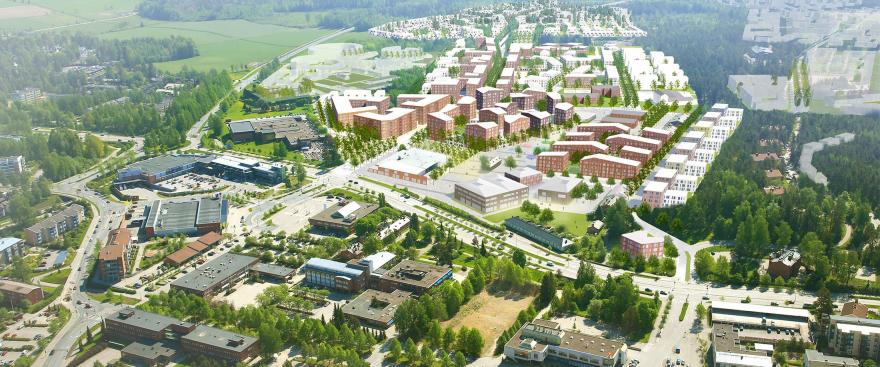Citizens are not just citizens – an abstract group of people. Citizens are also users, customers, participants, experts.
In the NordForsk project Citizens as Pilots of Smart Cities (CaPs), researchers from the Nordic Region are devising new methods for citizen participation.
"Working with local authorities and citizens is one of the most inspiring aspects of the project"
Tuomas Ahola, project leader of CaPs

Accelerating change in citizen participation
Tuomas Ahola is Associate Professor at Tampere University and the project leader for CaPs. He explains why involving citizens is important.
“Citizens are the end-users of urban infrastructure and various forms of public services. In this role, they are the leading experts in evaluating the value that public facilities and services offer – they are also experts in suggesting areas for improvement. Historically, citizens have often played an insignificant and merely symbolic part in urban development. This is now rapidly changing, and the CaPs project team is doing its best to accelerating this change.”
One of the goals of the CaPs project is to develop new methods that promote citizen participation. Can you give an example?
“We have an excellent example from the City of Tampere in Finland. During autumn 2020, the CaPs project collaborated with Tampere to develop workshop practices used in their participatory budgeting programme. The purpose of these workshops was to co-design urban development projects in a dialogue involving citizens and public servants. By participating and systematically observing the workshops that took place, we were able to propose several recommendations for improving the co-creation of value in forthcoming workshop sessions. These recommendations relate, for example, to the various roles assumed by public servants and citizens in the workshop sessions and how a constructive dialogue of ideas can be facilitated.”

Tuomas Ahola
You will co-operate with vulnerable groups, such as the elderly, immigrants and the unemployed. How do you aim to involve them?
“The research is being conducted in four work packages, each with specific objectives. One of them is called ‘Smart city for everyone - no one left behind’, which concentrates on vulnerable groups within society. This is crucial, as many citizens are unable to access, or skilfully use, various digital services (such as employment services) that are vital for their well-being. The CaPs project provides representatives of vulnerable citizen groups with working methods they prefer – such as open-ended personal discussions.”
The project began last year and will continue until 2023. Can you describe how you have experienced the collaboration between the researchers, local authorities and citizens?
“Working with local authorities and citizens is one of the most inspiring aspects of the project as we are continuously exchanging ideas and considering how citizens could become more engaged in sustainable urban development. While most of these collaborations have taken place online until now, we are very much looking forward to meeting our stakeholders in person soon again!”
Citizen involvement in Tuusula

B & M Architects Ltd
Tuusula is one of the local authorities participating in the project. Tuusula has 39,000 inhabitants, is located 25 kilometres north of Helsinki, and has several urban centres, the largest of which is Hyrylä.
Work has been underway here for several years with the development of central provision and services, such as shopping centres, cultural centres and upper secondary schools. In the next few years, approximately 15,000 new homes will be built close to the town centre.
“It has been extremely useful and educational for us to collaborate with the researchers,” says Heidi Hagmann, development manager at Tuusula.
“The development in Hyrylä will lead to enormous changes for the local authority and people, and therefore it is important for us to involve the population in a positive way. The researchers in the CaPs project have helped us with new methods for involving local people, not least in relation to where and when the community can take part. As a medium-sized local authority, Tuusula lacks the resources to implement this type of project on its own, so working with the researchers and their innovative, high-quality methods has been extremely valuable.”
What is the response from the citizens when you involve them?
“Local people are extremely positive about becoming involved. We conducted a survey and received several hundred responses from residents who want to play a part in the development process. We have started discussion groups and held meetings with the citizens, so that they are involved in the planning process. It is a learning curve for both parties: we learn how to involve the citizens, and they learn how to become involved.”
Urbanisation and smart cities
CaPs is one of four research projects under NordForsk’s Sustainable Urban Development and Smart Cities Programme looking at how cities in the Nordic Region can become even more sustainable and climate-friendly.
Smart cities is a concept applied increasingly in sustainability debates. What is it, and how does it contribute to a greener and more sustainable Nordic Region?
“Smart cities excel in leveraging the complementary knowledge, capabilities, and resources of heterogeneous actors such as public servants, companies, citizens, foundations, etc. Through a process of co-creation involving networks of actors and emerging technologies, smart cities will – over time – be able to achieve long-term sustainability.”
The Nordic countries are highly developed digital societies. Does this provide an advantage, a competitive edge, in the development of smart cities?
“Nordic countries are forerunners in the adoption of many kinds of digital technologies. In particular, the openness of various types of data and the use of standardised data interfaces allows the rapid development and adoption of new tools and services supporting sustainable development. Digital technologies also play a major role in the inclusion of citizens in urban development as they tend to be more cost-efficient, visual and instantaneous entry point to participation than traditional alternatives.”
How will your research project contribute to the development of smart cities?
“The CaPs project develops scalable, citizen group-specific and easy-to-adopt methods that promote citizen participation in smart and sustainable urban development in the Nordic context.”
Citizen involvement in the Nordic Region
The Nordic Region aims to be the most sustainable and integrated region in the world by 2030. This is the core of the vision adopted by the Nordic Council of Ministers and the Nordic prime ministers in August 2019.
In order to realise this vision, the Nordic Council of Ministers will work to involve everyone living in the Nordic Region in the green transition and digital developments and support and include civil society in its work.

